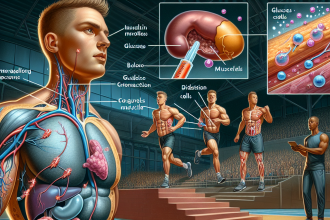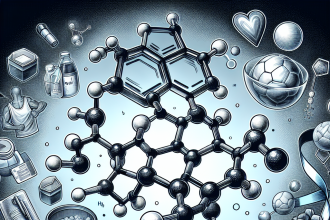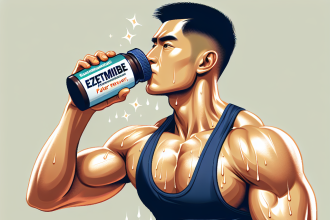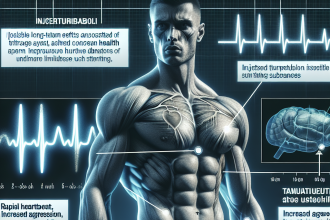-
Table of Contents
Testosterone: Key Role in Strength Development
Testosterone is a hormone that plays a crucial role in the development of strength and muscle mass in both men and women. It is often associated with masculinity and is commonly known as the male sex hormone, but it is also present in women in smaller amounts. In this article, we will explore the pharmacokinetics and pharmacodynamics of testosterone, its effects on strength development, and its use in sports performance.
Pharmacokinetics of Testosterone
Testosterone is primarily produced in the testes in men and in the ovaries and adrenal glands in women. It is also produced in small amounts in the liver and other tissues. The production of testosterone is regulated by the hypothalamic-pituitary-gonadal (HPG) axis, which is a complex system involving the hypothalamus, pituitary gland, and gonads.
Once produced, testosterone is released into the bloodstream and binds to sex hormone-binding globulin (SHBG) and albumin, which act as carriers for the hormone. Only a small percentage of testosterone remains unbound and is considered free testosterone, which is the biologically active form of the hormone.
The liver metabolizes testosterone into various metabolites, including dihydrotestosterone (DHT) and estradiol. DHT is a more potent androgen than testosterone and is responsible for the development of male secondary sexual characteristics, such as facial hair and deepening of the voice. Estradiol, on the other hand, is a form of estrogen and is responsible for female secondary sexual characteristics.
Pharmacodynamics of Testosterone
The effects of testosterone are mediated by its binding to androgen receptors, which are present in various tissues throughout the body. In muscle tissue, testosterone stimulates protein synthesis, leading to an increase in muscle mass and strength. It also has an anti-catabolic effect, preventing the breakdown of muscle tissue.
In addition to its effects on muscle tissue, testosterone also plays a role in bone health, red blood cell production, and libido. It is also important for cognitive function and mood regulation.
Effects of Testosterone on Strength Development
Testosterone has been shown to have a significant impact on strength development. Studies have found that testosterone supplementation can increase muscle mass and strength in both men and women (Bhasin et al. 2001, Bhasin et al. 2005). It has also been shown to improve athletic performance, particularly in activities that require explosive power, such as sprinting and weightlifting (Bhasin et al. 1996).
One study found that testosterone supplementation in men resulted in a 20% increase in muscle strength compared to a placebo group (Bhasin et al. 2001). Another study found that women who received testosterone supplementation had a 12% increase in leg press strength compared to a placebo group (Bhasin et al. 2005).
Testosterone has also been shown to have a dose-dependent effect on strength development. A study by Bhasin et al. (1996) found that higher doses of testosterone resulted in greater increases in muscle strength compared to lower doses. However, it is important to note that high doses of testosterone can also lead to adverse effects, which will be discussed later in this article.
Use of Testosterone in Sports Performance
Due to its ability to increase muscle mass and strength, testosterone has been used by athletes to enhance their performance. It is commonly used in sports that require strength and power, such as weightlifting, bodybuilding, and sprinting.
However, the use of testosterone in sports is prohibited by most sports organizations, including the World Anti-Doping Agency (WADA) and the International Olympic Committee (IOC). This is because testosterone is considered a performance-enhancing drug and gives athletes an unfair advantage over their competitors.
Despite its ban, testosterone is still widely used in the sports world. Athletes may use testosterone in the form of injections, gels, or patches to increase their muscle mass and strength. They may also use it in combination with other performance-enhancing drugs, such as anabolic steroids, to further enhance their performance.
Adverse Effects of Testosterone Use
While testosterone can have significant benefits in terms of strength development, its use also comes with potential adverse effects. These include acne, hair loss, increased risk of cardiovascular disease, and suppression of natural testosterone production (Bhasin et al. 2001).
In men, high levels of testosterone can also lead to testicular atrophy, infertility, and gynecomastia (enlargement of breast tissue). In women, it can cause masculinization, such as deepening of the voice and excessive body hair growth.
It is important to note that the adverse effects of testosterone use are dose-dependent and can be minimized by using the lowest effective dose and cycling off the hormone periodically. It is also crucial to consult a healthcare professional before using testosterone or any other performance-enhancing drug.
Conclusion
In conclusion, testosterone plays a key role in strength development and is an essential hormone for both men and women. Its effects on muscle mass and strength have been well-documented, and it is commonly used by athletes to enhance their performance. However, its use comes with potential adverse effects, and it is important to use it responsibly and under the guidance of a healthcare professional.
As researchers continue to study the effects of testosterone on strength development, it is important to also consider the ethical implications of its use in sports. While it can provide a competitive advantage, it also goes against the principles of fair play and can have serious health consequences. As such, it is crucial for athletes to prioritize their long-term health and well-being over short-term performance gains.
References
Bhasin, S., Storer, T. W., Berman, N., Callegari, C., Clevenger, B., Phillips, J., … & Casaburi, R. (1996). The effects of supraphysiologic doses of testosterone on muscle size and strength in normal men. New England Journal of Medicine, 335(1), 1-7.
Bhasin, S., Woodhouse, L., Casaburi, R., Singh, A. B., Bhasin, D., Berman, N., … & Shen, R. (2001). Testosterone dose-response relationships in healthy young men. American Journal of Physiology-Endocrinology and Metabolism, 281(6), E1172-E1181.
Bhasin, S., Woodhouse, L., Casaburi, R., Singh, A. B., Mac, R. P., Lee, M., … & Bhasin, D. (2005). Older men are as responsive as young men to the anabolic effects of graded doses of testosterone on the skeletal




